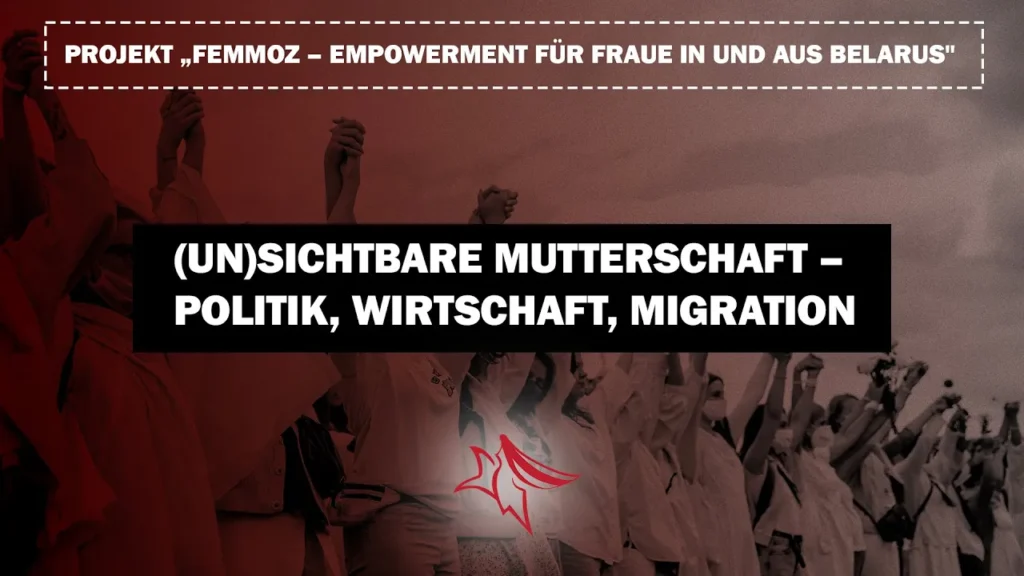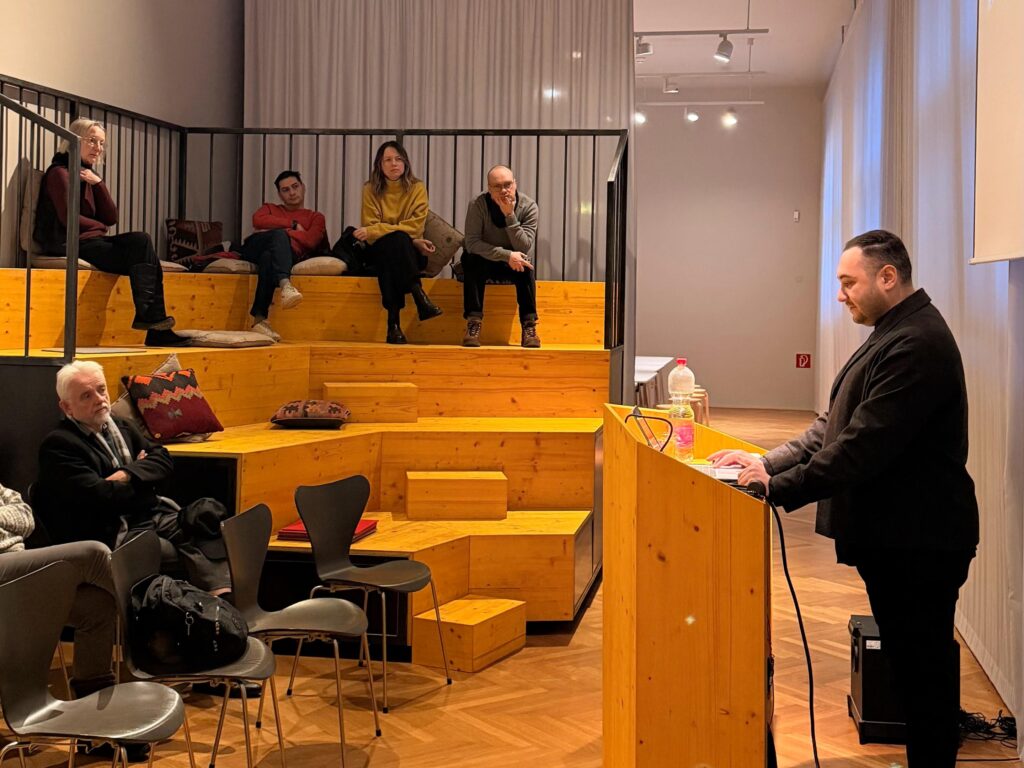Online-Diskussion “(Un)visible motherhood – political activism, economic perspective, exile”
Belarusian experts discuss the experience of political persecution of mothers, the difficulties of combining motherhood, work and activism, as well as the reasons for the decline in the birth rate. The speakers shared their experiences of migrating with children and settling into a new country and discussed what is (not) being done to make public spaces and events more inclusive for mothers.
Panelists:
- Yulia Vasilyuk – journalist, has written on the topics of non-discrimination and gender equality, participant of the USAID Women’s Leadership program, and author of 15 books for children
- Maya Tserakulava – pediatrician, medical blogger, and columnist for New Hour, Mirrors, Media Loft
- Victoria Lavrinyuk – a member of the KS Femgroup, doctoral student studying gender-based violence and systemic discrimination against women and vulnerable groups
Moderation:
- Lena Ogorelysheva – . sociologist and femactivist
Why are we talking about motherhood and not fatherhood?
Panelists note that organizations such as UNFPA and the UN Population Fund are working on engaged fatherhood and are doing numerous projects on the matter, including a new study on engaged fatherhood. The findings suggest that the average father spends only three hours a day with his child (on weekends) and two hours a day on weekdays. When it comes to children under the age of 10, the average mother spends five times as much time with her child as the father.
In addition, the mother is engaged in all kinds of activities with the child, whether it is upbringing, maintenance work of various kinds, and other – communication, involving the child in various classes, checking homework, communication, and conflict resolution. When the father spends time with the child, it is mostly walking and playing at home or outdoors. In Belarusian society, although fathers are increasingly willing to spend time with their children, the main burden of parenthood lies on mothers. That is why the FemMoz project found it important to focus on this very matter and talk about what is not visible in motherhood. The discussion addresses how motherhood is an additional factor of vulnerability – including for Belarusian female activists (55% of them have children, with more than 20% having one, a little more than 20% having two, and about 9% having three).
Why do Belarusian women postpone motherhood?
Experts note that the average age of having the first child has exceeded 27, and this age is gradually increasing. Many women in Belarus also decide to postpone motherhood, and there are many reasons for it.
One of the panelists notes that she decided to give birth to a child once she had the time and a safety cushion because the child allowance in Belarus is not sufficient. The allowance is enough to cover the child’s needs but this makes the mother dependent on her husband or other relatives to support the family – because the mother, who takes care of the child, also has to be provided for. This raises the question of whether Belarus is a favorable country for being a mother.
Since 2020, Belarus has seen not only an economic downturn but also a worsening of the political and social situation. The authorities have launched a crackdown on activists, including through means of manipulating parental rights. Government officials are allowed to do whatever they want. People facing persecution and detentions often hear threats of losing the child: “The state will raise the child better”, “Can you even raise a child?”.
One of the panelists has experience of motherhood not only in Belarus but also in Kazakhstan. She points out that in the latter, motherhood is treated more traditionally, and families usually have several children. In Belarus, women are more emancipated, with self-realization being more important for them, which is not built through motherhood only. Therefore, Belarusian women give birth later because they want to get a profession, achieve self-realization, save up money, and become independent from a man. The experts note that in this situation women need more support institutions, which the state should create. This is a global trend – the more developed a society is, the more emancipated women are in it, and the more emancipated women are, the later and less they give birth.
One of the experts, who has experience of motherhood in different countries and experience researching gender and motherhood in different countries, notes that there is no ideal country for this. According to statistics, only 1% of fathers in Belarus take paternity leave. That is, the vast majority of childcare leave is taken by women. Fathers can take this leave for two weeks, and not instead of the mother, but in addition to her and it is unpaid. Studies show that in traditional families the entire burden is borne by the woman, while in more egalitarian families, which belong to the middle and upper-middle socio-economic class, fathers are more involved in fatherhood. An example is the Belarusan IT sector workers. Part of the UNFPA program in Belarus is aimed precisely at IT workers to make them pioneers in involved fatherhood.
The panelists also raise the issue of the mental burden of parenthood. Dealing with children at the household level is one thing but organizing their leisure time and other matters is another. Thinking about when to buy food, what kind of food to prepare, when to make an appointment with the doctor, when to make revisions, when to buy stationery, and when to do something else. This is a significant part of parenthood, which is done in most cases by women, including in Belarus.
The panelists also note an important problem characteristic of motherhood in post-Soviet countries – medical violence in childbirth and pregnancy. Often women are seen as objects whose primary function is to give birth to a child as a duty to the state. And so women are not asked how they want their labor to proceed. There is a protocol according to which medics strictly act, and the fact that it does not suit a particular woman does not bother them. In Belarus, mental diseases are stigmatized and are not talked about. Postnatal depression is one of these diseases. It is difficult to estimate how many undiagnosed women experience depression after childbirth. This is because no system in Belarus supports women in such situations and monitors women in general. Women’s mental and physical well-being is of little interest to anyone, as a woman is needed to “give birth to a child to perform her duty to the state.”
Combining motherhood with other activities
During the discussion, the experts talk about the issues of combining motherhood with other activities. They discuss how difficult or easy it is in Belarus and whether there is a difference in comparison with other countries (maternity support, involved parenting).
A panelist shares her experience in Lithuania and says that she combined creative work, writing books, with raising a child, so she had to work during the day while her son was sleeping and at night, to the detriment of her own rest. It became easier to combine it when the child started to go to kindergarten. For Belarusians being forced into exile it is worth noting that in Lithuania school is compulsory for all children. So the child will be assigned a place in school at any time of the school year and with any kind of documents (residence permit or national visa). In the case of kindergarten, however, there are more bureaucratic challenges, and searching for available places can take a lot of time. It can be especially difficult if a family has no close relatives who can help with childcare or if a nanny is only needed for a few hours on request – these are harder to find. There can be an additional strain on the mother if the child requires the physical presence of the mom or wants tactility all the time.
Experts note that in Belarus there are difficulties with after-school programs in schools – they often close at exactly 18.00. However, in most cases, parents’ working day ends at the same time, and there is no easy solution to how they can have time to pick up their children. Little children can’t walk home on their own, and parents often have rigid, inflexible schedules. They do not have a financial opportunity to hire a nanny for this purpose or involve grandparents. This is why Belarusian women often have to choose flexible forms of employment, which can worsen their careers, as such jobs are not well-paid. Therefore, there is a significant gap in salaries in Belarus, not only because of discrimination but also because of the women’s choice of such forms of employment. They can be combined with motherhood and women choose them because parenthood rests mostly on women’s shoulders. Systemic discrimination of women exists in many ways, which affects them even after retirement.
On motherhood and political persecution
As shown by the statistics of human rights organizations of Belarus, various independent monitoring agencies, and the huge number of testimonies by people who went through repressions in Belarus, parenthood and especially motherhood is an additional vulnerability and a factor of pressure from the regime.
In Belarus, there is Presidential Decree No. 14 “On Socially Dangerous Situation” (On Vulnerable Families), which provides for assigning a family the status of socially dangerous for a child. A commission can be convened, which then needs to go to a particular family and make its verdict on whether or not this is the case. The family can end up being recognized as “socially dangerous” to children. The experts share that some people could have three such commissions show up in one day, with the first one coming at 7 a.m. and asking: “Why aren’t your beds made?”. This mechanism has always been a repressive tool.
At the same time, there have been many cases when families that posed a real danger to the child were overlooked because they were not a priority. The priority was always families persecuted by the state on political grounds.
Another major problem, as the experts point out, is that when a woman facing domestic violence writes a statement that her partner is an aggressor, she is required to sign an informed consent that this statement puts the “socially dangerous” label on her family. If after six months she does not separate from the aggressor, the children are placed in social institutions. This is a significant problem because this is one of the reasons why women do not report aggressors. Experience shows that this is the reason Belarusian women revoke their statements. Many prefer to stay with both the aggressor and their children because in some cases women cannot separate due to economic reasons.
When a pediatrician is instructed to become a member of the commission to check on potentially “socially dangerous” families, their task is to assess the child’s health. They check whether the height, weight, and mental development correspond to the age and whether the child has any diseases, deficiencies, skin conditions, or signs of diseases that may be associated with improper care of the child. Then the pediatrician signs a medical report and sends it to the social guardian, and this is the end of the doctor’s responsibilities. However, an expert with experience in participating in such commissions notes: “Before 2020 I visited mostly dysfunctional families. But after 2020 I was often instructed to check on absolutely wonderful people. With my colleagues, we would often discuss: “Are they really “socially dangerous?” “No, just political.” So we even had a definition to say that it’s not a family “at risk”, but just political. But my job was to check that the child is healthy and properly cared for. And I don’t know what happened next. It is a fact that political activists are reported for “socially dangerous” behavior, so commissions visit their homes.”
In addition to the “socially dangerous” status, there are other levers of pressure from the regime on mothers or parents in Belarus in general: for example, fear of political imprisonment of parents, fear of harsh detention by law enforcement agencies, house raids and the fact that it will scare children. The regime’s propaganda at schools is another factor for families to leave Belarus.
Children are the main lever of pressure on parents and primarily mothers. They are more involved in parenting, with a huge number of mothers raising children on their own. And when a woman becomes a political prisoner, she continues to be blackmailed with her children even there – this is what the experts see in their conversations with repressed Belarusians. Women are not allowed to receive visits from their children in prison. If a woman does not do what she is expected to do – for example, does not plead guilty, or does not sign a petition for pardon – she is blackmailed with extending her sentence. Even mothers nursing their babies fall under repression, they are also not provided with proper medical care in detention. All this creates pressure on female activists in Belarus.
Child-friendly environment
Another topic discussed by the panelists is whether there are child-friendly events in Belarus or the countries of exile of Belarusian women. The experts characterize Belarus as a child-hating country: “In Belarus, children are hated. You may hear once a year that “a mother is sacred” and “we all love children so much”, and “let’s award the Order of Mother to large families.” But this happens once a year, and the rest of the time you see that you are hated, and hated at the level of the state. You face hate anywhere you go with a child because children are not perfect. Everyone wants them to be taxpayers from birth, well-behaved children, who are ready to serve their country, pay taxes, and continue having more children.” Also, Belarus does not provide comfortable social conditions for pregnant women.
Experts note that there is a positive difference in the attitude towards children in Lithuania. There are changing rooms in shopping malls, toilets have baby seats and potties, etc.
One of the speakers is raising a child with a disability. She highlights her experience of motherhood in Poland: “From Bialystok, where we live, it is 20 kilometers to Belarus, but the difference is very noticeable. In Poland there is inclusion for children and adults with disabilities – there are many such people in society. Nothing is surprising here – it is not uncommon to meet a person with low mobility in a wheelchair anywhere, there are ramps everywhere. There is also a sense of awareness about autism. Belarus, I often heard: “What an ill-mannered child!” “Whose child is this? Calm down your child.” And here, people just know that it has autism. It is much easier to live when people, seeing that the child behaves unusually or attracts attention with noise or some type of behavior, just look away and mind their own business. When a child with a disability demands attention, trying to explain to others what’s going on takes away from the time you should be devoting to your child right now”.
Sharing their experience, the panelists note that Belarus lacks a child-friendly policy. There is a lot of entertainment for children, but moms turn out to be an appendage to the child. The experts propose creating such spaces where moms could come with their children so that moms could discuss their problems or deal with their own issues, while children would be supervised or at least just around.
The democratic forces’ Fem Group and the Belarusan fem community have admitted that there is little “space” for activist moms, they lack visibility.
Most activist or professional events do not take into account the fact that a woman may have children and that something needs to be done with these children so that the mother can participate. Thus, a large group of women becomes excluded from social and political activism. This is systemic and structural discrimination because if women are excluded from political activism, all the problems that these women face will remain invisible.
The current regime in Belarus promotes traditional, patriarchal values. But, as the experts say, the democratic forces should include more inclusive aspects in their programs and projects.
For an activist mother to have equal opportunities with other activists, she needs help with her children. But this help is perceived as something “extra”, additional. The experts in the discussion think it is important to advocate for this issue.
“We have discussed many times with Fem Group and the fem community in general why female experts are absent from many events. It is because they are invited to many events at the last minute. Last minute means that you cannot plan your trip ahead and buy a cheaper ticket or delegate your responsibilities, including those related to maternal duties,” the panelists note.




